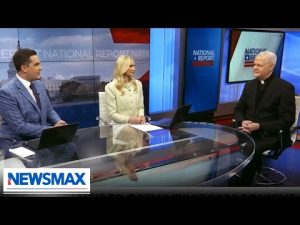**Title: Downsizing the Government: A New Conservative Approach to Efficiency**
In recent discussions among conservative circles, the topic of government efficiency has taken center stage—more specifically, the delicate balance between downsizing the government and properly utilizing its resources. With prominent figures like Donald Trump advocating for cuts across many federal programs, the question has emerged: how do Republicans create a leaner, more accountable government that genuinely serves the American people? It seems the answer lies not just in cutting programs, but in re-evaluating their purposes and effectiveness.
Over the past few weeks, significant changes have been observed, sparking discussions that many thought would never see the light of day. The unexpected partnership between Donald Trump and tech mogul Elon Musk has hinted at a new era in Washington, one that could bring about the structural changes many conservatives have long demanded. It’s akin to watching a lightbulb go off in the heads of politicians: if certain bureaucratic processes aren’t working, why continue to fund them? This dynamic duo is calling for shock-and-awe tactics to counteract the entrenched systems that could otherwise resist any form of meaningful reform.
The bureaucratic malaise that fills many federal offices often hides numerous funding streams and programs that seem to defy logic. Critiques have been leveled at the idea of simply slashing budgets without examining the underlying issues—the “deep state” continues to operate with taxpayer dollars that sometimes find their way into dubious ventures. When Americans find out that their hard-earned money is funneled abroad to fund programs that do little more than prop up opposing ideologies, it makes their blood boil. The challenge ahead, then, is not merely to cut funds but to confront and dismantle these systems with strategic intensity.
For instance, there’s a mixed bag when it comes to certain government-funded organizations like the National Endowment for the Arts (NEA) or the National Endowment for the Humanities (NEH). Should these bodies continue to exist, or are they simply past their prime? Many conservatives might argue for total elimination, especially given their controversial track records of funding questionable art projects. Conversely, proponents could suggest that with a appropriate reform, these organizations might serve a meaningful purpose by promoting truth, beauty, and classic American values. After all, uplifting national pride through civic architecture and art could invigorate the cultural landscape that has dimmed over the years.
As the debate rages on, intriguing proposals have surfaced about re-building aspects of the government instead of simply demolishing them. The notion of replacing outdated buildings like the J. Edgar Hoover Building with beautiful, classical architecture is just one example of how a fresh start could symbolize a new direction for the government. It’s vital to remind Americans of the values their country embodies through grand monuments and vibrant community spaces, rather than walling them in with cold, uninspiring structures that reflect nothing of their history or aspirations.
As the dust settles on this ongoing dialogue, one thing is clear: accountability is up for discussion. With over 20,000 federal employees taking buyouts to potentially shrink the size of government, there’s a sense of urgency in reevaluating what services truly need to survive. Conservatives are now eyeing the housing market, where inflated prices have become a hallmark of life around Washington, D.C. The hope is that a leaner government could help stabilize these outrageous costs and contribute to a more equitable economy.
In summary, as the Republican party navigates the intricate waters of government reform, the focus is shifting toward not just downsizing government but ensuring that it works efficiently and effectively for its constituents. It is a delicate balance of trimming the fat without losing the core values that define American governance. With pressure mounting to make changes and embrace the future, the American people may soon see a government that truly serves them—a lean, efficient machine that respects taxpayer dollars and carries the spirit of their founding principles into the future. Now, wouldn’t that be a refreshing sight?



